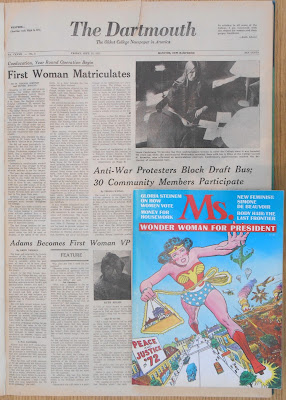 When we look back at major milestones in Dartmouth's history, we often get caught up in the local conditions that spurred the changes and forget about the broader cultural context. Dartmouth's decision to admit women is a case in point. The discussions we see almost always revolve around the campus response, the difficulties the first generations of women faced, and the impact on campus life. But, of course, the decision to make Dartmouth a co-ed institution occurred at a time when the nation as a whole was wrestling with issues raised by second-wave feminism.
When we look back at major milestones in Dartmouth's history, we often get caught up in the local conditions that spurred the changes and forget about the broader cultural context. Dartmouth's decision to admit women is a case in point. The discussions we see almost always revolve around the campus response, the difficulties the first generations of women faced, and the impact on campus life. But, of course, the decision to make Dartmouth a co-ed institution occurred at a time when the nation as a whole was wrestling with issues raised by second-wave feminism.That national context was one of the reasons we were thrilled to receive a mint condition inaugural issue from 1972 of Ms., the magazine that quickly became the primary venue for mainstream feminist thought. Just a month later the first class of women enrolled at Dartmouth. The 1972 local news in the D resonates in new ways when juxtaposed with this new voice of a national movement. But also, the cover stories speak to the continued social and political battles of today: "Wonder Women for President," "Money for Housework," and "Gloria Steinem on How Women Vote."
Come see it, and the curious mix of ads it contains (Coppertone wasn't too sure how to speak to the feminist movement!) by asking for Rare HQ1101.M55 Vol 1, No.1, 1972.
